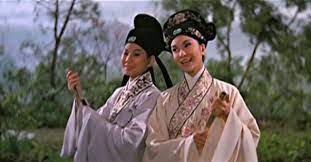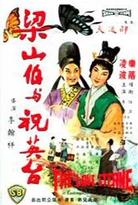Eye For Film >> Movies >> The Love Eterne (1963) Film Review
The Love Eterne
Reviewed by: Jennie Kermode

One of Hong Kong’s best loved musicals in its time, and screened at 2023’s Queer East film festival, The Love Eterne is an adaptation of the Chinese legend Butterfly Lovers. It plays very differently to a modern audience, and to a Western one. The narrative is naïve and simplistic and incredibly drawn out, and viewers unaccustomed to the high, stylised vocals or repetitive motifs of Huangmei opera may find it grating. That said, this is a fascinating historical artefact, and for those interested in the cinematic art form itself, there’s a lot to unwrap.
Zhu Ying-tai (Betty Loh Ti) is an unhappy teenager whose acting out gives way to a refusal to get out of bed or engage with life in any way. This may not seem to make for an appealing heroine, but there’s an understandable reason for it. As she puts it, she prefers literature to jewels, and longs to study, but her conservative father believes that women should be confined to the boudoir. A sympathetic female doctor persuades him that the solution is to let Ying-tai dress in masculine clothes and pretend to be a man, so that she can attend university without the risk of men taking advantage of her. He acquiesces and soon she’s off to school in Hangzhou for a three year course of study.

As everyone familiar with dramas of this ilk knows, this sort of cross-dressing is a guaranteed ticket to complicated romance. Before long, Ying-tai has acquired a sworn brother, Liang Shan-bo, and in due course she falls in love with him. He, of course, never guesses that she might not be what she appears to be. The first half of the film is essentially a stylised romcom. The second deals with what happens when Ying-tai’s father arranges a marriage for her, declaring “Since the beginning of the universe, no girl ever chooses her own husband.” In a Western film, this would just be another barrier to overcome. In an Eastern one, with duty to the family a much higher priority, it leads to tragedy.
The story is complicated aesthetically by the fact that Ying-tai is one of the world’s least convincing cross-dressers (and, of course, Western viewers unfamiliar with the styles of that place and time are likely to perceive her garb as feminine anyway). What’s more, in keeping with Huangmei tradition, Shan-bo is also played by a woman (Ivy Ling Po) who does not look remotely masculine, though we are supposed to imagine that she does. Loh Ti having been cast for her acting, her singing is dubbed by Tsin Ting, whose prolific work of this sort adds another layer of distraction for those who know this cinematic tradition well.
In a key scene which the film will keep returning to, the disguised Ying-tai wanders beside a river with Shan-bo, pointing out the golden carp, Mandarin ducks and geese who swim there is pairs. As she stresses that their own intimacy should endure forever, and he says that that type of bond is only possible between a man and a woman, she is petitioning for same sex marriage. The film borrows the innate tragedy of queer romance in a homophobic society whilst holding out the tantalising hope that by transforming herself again, Ying-tai can save the situation. In the end, it’s another type of transformation which becomes the lovers’ only hope.
Woven into this is an outspoken criticism of patriarchal control over women’s lives. In conversation with her servant, Ying-tai directly asserts that women and men are equal and that traditional rules constraining women’s activities are ridiculous. This was a bold way to interpret a classic tale back in 1962, and the combination of old and new values may account, in part, for the rapturous reception which the film received, with many people returning to see it at the cinema over and over again. Whether or not you will enjoy watching it comes down to personal taste, but it is certainly important, and will inform your understanding of the cinema and culture of the region more generally.
Reviewed on: 29 Apr 2023
















